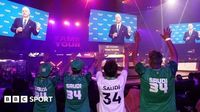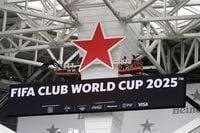The 2025 FIFA Club World Cup has officially kicked off in the United States, marking a significant transformation for the competition with its expanded 32-team format and a staggering $1 billion prize pot. Over the next month, 32 of the world’s best clubs from six continental confederations will compete across 63 matches held in 12 stadiums nationwide, including iconic venues such as Miami's Hard Rock Stadium and Los Angeles’ Rose Bowl.
This revamped tournament, held once every four years, promises to reshape club football's global landscape, combining footballing excellence with massive financial incentives. Real Madrid, the most successful team in the competition’s history with five titles, are among the favorites, especially with new manager Xabi Alonso at the helm. The Spanish giants have also made headlines by securing the early signing of England international Trent Alexander-Arnold from Liverpool for a reported €10 million, who is set to make his debut in Miami.
Joining Real Madrid are other European heavyweights including Paris Saint-Germain, the reigning Champions League winners, Bayern Munich, Manchester City, Chelsea, and Inter Milan. On the South American front, traditional powerhouses like Boca Juniors, River Plate, Fluminense, and Copa Libertadores holders Botafogo headline the continent’s representation, with Brazil notably having four clubs in the tournament due to their recent dominance in continental competitions.
The tournament’s expansion from a modest seven-team event to 32 sides has not come without controversy. Player welfare concerns loom large, with many athletes already battling fatigue after long domestic seasons and international duties. Notably, Rodri of Manchester City suffered a season-ending ACL injury in September 2024, highlighting the physical toll on players. A recent study recommended a mandatory four-week rest period for players, fueling debates about the congested football calendar. England manager Thomas Tuchel has voiced concerns about players suffering in the American summer heat, a sentiment echoed by star striker Harry Kane, who remarked, "I don’t think the players are listened to that much. Everyone wants their piece, their tournament, their prize — and the players have to get on with it."
Financially, the stakes are immense. The total prize fund of $1 billion (£775 million) is shared among all participating clubs, with winners potentially earning up to £97 million, a sum comparable to the Premier League and Champions League payouts. Participation fees alone amount to £406 million, distributed based on sporting and commercial criteria. FIFA has pledged to redistribute £185 million of the prize money to non-participating clubs worldwide through a solidarity program, emphasizing a commitment to the broader football ecosystem.
Broadcasting arrangements have also been revolutionary. DAZN secured global rights for $1 billion in December 2024, promising free live coverage of all matches, a move unprecedented for a tournament of this scale. Shortly after, Saudi Arabia’s Public Investment Fund (PIF) acquired a $1 billion minority stake in DAZN, further intertwining Saudi investment with the tournament’s commercial fabric. PIF also owns Al-Hilal, one of the competing clubs, and recently became an official Club World Cup partner. This financial entanglement has drawn scrutiny and allegations of a "marriage of convenience," with critics suggesting Saudi Arabia’s involvement is both a bailout for FIFA and a strategic move ahead of its hosting of the 2034 World Cup.
FIFA President Gianni Infantino has defended the tournament and Saudi Arabia’s role, asserting the competition will "make football truly global" and can act as a catalyst for social progress. However, concerns persist regarding the tournament's impact on domestic leagues, player workload, and environmental factors, especially given the tournament’s expansion from seven matches in a single city to 63 matches across 11 cities.
The tournament also serves as a dry run for the upcoming 48-team FIFA World Cup in 2026, co-hosted by the United States, Canada, and Mexico. Organizers will closely monitor logistics, player adaptation to climate conditions, and venue readiness over the next month.
On the pitch, fans can expect thrilling encounters. Chelsea, the 2021 Champions League winners, arrive with fresh signings like Liam Delap, who was snapped up from Ipswich for £30 million. They face a challenging group including Flamengo and Los Angeles FC. Manchester City, rebuilding after a mixed season, have added promising talents such as Rayan Cherki and Tijjani Reijnders, aiming to reclaim European dominance.
South American clubs, despite the grueling schedule, view the Club World Cup as a prestigious opportunity. However, teams like Boca Juniors and Botafogo face tough groups against European giants Bayern Munich and PSG respectively. The tournament also showcases football legends in the twilight of their careers, including Lionel Messi and Luis Suárez at Inter Miami, Edinson Cavani for Boca Juniors, Sergio Ramos at Monterrey, and Thiago Silva with Fluminense.
For many players, the Club World Cup represents both a lucrative prize and a physical challenge. The tournament’s success or failure in capturing fans’ imagination and managing player welfare will likely shape the future of global club football. As the competition unfolds, all eyes will be on Miami and beyond to see if this ambitious reinvention can live up to its promise.
Fans worldwide can watch every game live and for free on DAZN by registering for the platform’s freemium service. In the UK, Channel 5 will broadcast 23 selected matches, while in India, streaming is available via the FanCode app and Eurosport channels. The final showdown is scheduled for July 13 at New Jersey’s MetLife Stadium, featuring a Super Bowl-style halftime show headlined by Doja Cat, adding entertainment spectacle to footballing drama.
With the world’s best clubs converging in the US, the 2025 FIFA Club World Cup is more than just a tournament—it’s a bold experiment in football’s future, blending sporting excellence, commercial interests, and global expansion. Whether it will become a beloved fixture or a controversial footnote remains to be seen as the drama plays out on and off the pitch.



